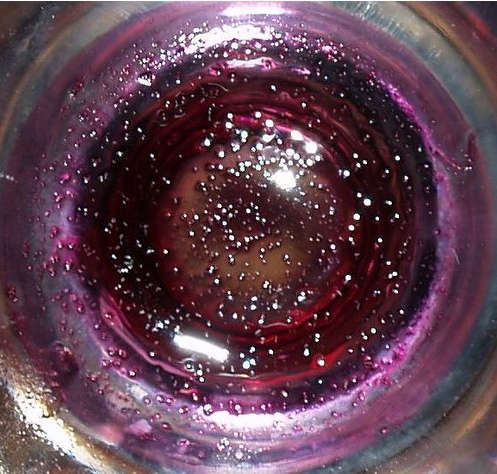FWP:
SETS == A,B; EXCLAMATION;
FILL-IN
WINE: {49,1}
Nazm points to a fine example of wordplay: the contrast between .saaf -- 'clean, pure, clear'-- and durd -- 'dregs, lees, sediment'. Ghalib even contrived to juxtapose these two words, so that the 'clear, limpid, pure' and the 'murky, thick, impure' would be bumped up against each other as ostentatiously as possible.
It's clear that we are drinkers of the dregs of Jamshid's Cup. But that's no ordinary wine-glass! As everybody in the ghazal world knows, the Cup of Jamshid was a very special one-- when he filled it with wine and gazed into the still surface of the wine, he saw reflected the whole world, and events from the past and future. When the Cup had been emptied down to the dregs, the magic reflecting surface would be gone, and this vision would no longer be apparent. So if we drink only the dregs, isn't that a wretched state of affairs? Aren't we getting only the miserable residue, as the word 'dregs' itself suggests? Jamshid got the magic visions, and the wine-- and what do we get? Only the dregs!
Then-- the ambiguities of the second line! It is totally inshaa))iyah , simply an exclamation. Moreover, this is an 'A,B' verse, in which we're left to decide for ourselves the relationship between the two lines. Right away, we need to ask whether the wine from Jamshid's cup is to be considered 'that wine not pressed from grapes'. Since that wine was impregnated with magic power, the reference seems quite possible. After all, if Ghalib wanted an unproblematical contrast between 'grape' wine and 'non-grape' wine, he could have used as an example of the former any amount of other wine (as in fact he does all the time). By choosing the wine in the Cup of Jamshid, the only 'non-natural' magic-filled wine in the whole ghazal tradition, he has at the very least forced us to pause and consider what classifications of wine he might have in mind.
If we decide that Jamshid's wine is to be considered 'not pressed from grapes', then the effect of the second line is to reinforce the tone of lament or complaint in the first line-- alas, that we're left vainly longing and thirsting for a kind of 'magic wine' of vision and insight! It's a wine that only Jamshid was actually able to drink, but we're hooked on the hope and the yearning, so we keep on swallowing even the dregs left in that alluring glass. Alas, for that wine-- it has enslaved us to a hopeless longing for vision, a hopeless attempt to recapture what once was a miraculous means of vision.
If we decide (with the commentators) that Jamshid's wine was indeed pressed from grapes, then the wine in the second line is some other wine, perhaps some intangible mystical wine of pure divine vision and transcendance. Or perhaps it is the wine of poetry, which has an intoxication like that of opium (see {33,4}). Or perhaps it is whatever kind of special joy we each might find in our own private pursuits. In any case, the lament seems to be for the neglect (or unavailability?) of some kind of non-physical wine-- we humans end up drinking wine that intoxicates our bodies, rather than our minds or spirits-- especially when it has a lingering flavor of magic, of supernatural powers. Marvelous powers, but alas! so long gone. Even so, we go on seeking for flavor in the dregs. Is this stubbornness good or bad? Naturally Ghalib, being Ghalibian as usual, makes it impossible to say.
The only other verse in the divan
that talks about 'dregs' is also a complex one: {232,2}.

Nazm:
That is, our wine-drinking too is of a lofty rank-- we haven't been vouchsafed that wine not made from grapes, so we can't touch our lips to it, because this is contrary to our imitation of Jamshid. Here Mirza Sahib has uttered a .zil((a -- that is, for the sake of durd he has brought .saaf into the verse. (106)
== Nazm page 106